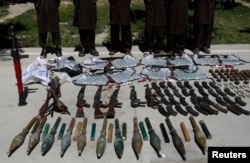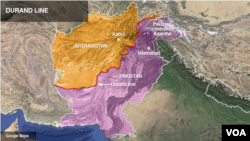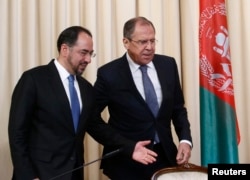Afghanistan’s ambassador to Pakistan has accused the neighboring country of contributing to the continuous violence in his war-ravaged nation by not cutting ties to the Taliban.
Omar Zakhilwal told an international conference in Islamabad Thursday that neighboring and regional countries need to create a “broader” consensus to help end hostilities in Afghanistan and promote political reconciliation there.
“We do not believe that Pakistan has yet given up on “strategic depth” in Afghanistan, unfortunately. Despite the rhetoric, we do not believe that it has changed its policy. They contribute to the continuous violence in Afghanistan,” the ambassador asserted.
Islamabad has long been accused of supporting the Taliban and harboring leaders of the Haqqani network in a bid to gain an upper hand over security and political developments in Kabul so it could counter rival India’s growing influence there.
The so-called policy of “strategic depth” in Afghanistan has been at the center of Kabul's political tensions with Islamabad.
“Taliban could not [have] come back at the strength they are without support from here [Pakistan],” Zakhilwal said.
Pakistani officials, however, dismiss the charges as “mere perceptions” and say their contacts with the Taliban are meant only to encourage them to end violence and join peace talks.
During his visit to Afghanistan last month, U.S. National Security Adviser H.R. McMaster also called on Islamabad to rethink its policy toward the neighboring country.
“The best way to pursue their interests in Afghanistan and elsewhere is through diplomacy, not through the use of proxies that engage in violence,” McMaster said.
Zakhilwal Thursday also sounded skeptical about a Russia-led multi-nation process aimed at promoting peace and stability in Afghanistan.
“Even though we do participate [in it], there are suspicions with respect to the motives, with respect to the recent contacts [with the Taliban] and those need to be addressed,” Zakhilwal noted. He was indirectly referring to overt contacts Russia and Iran have maintained with the Taliban.
The ambassador went on to suggest that unless prevailing “doubts and suspicions” are removed, Moscow-led efforts many not be effective even if primary stakeholders are participating in them.
Russia has hosted three meetings of Afghanistan’s immediate and far neighbors since December 2016 to try to find ways to bring the Taliban to the negotiating table for talks with the Afghan government.
Pakistan, Iran, China, India and former Soviet Central Asian states, as well as Afghanistan, are part of the process.
But the U.S. administration refused to attend when Moscow invited it to the last meeting in April, saying it was not given enough time and Washington was unclear about the motives.
The U.S. military alleges Russia’s stepped up Afghan diplomacy is meant to undermine international efforts to stabilize Afghanistan. Russian leaders have rejected the charges as groundless.



